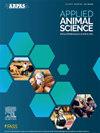Exploring Alabama beef producers’ perceptions and implementation of sustainable practices within the beef industry
IF 1.5
Q3 AGRICULTURE, DAIRY & ANIMAL SCIENCE
引用次数: 0
Abstract
Objective
With sustainability in the agriculture industry becoming a greater focus, it is important to understand how beef producers view sustainability and sustainable initiatives. The objective of this research study was to assess Alabama beef producers’ opinions of sustainability, sustainable practices within the industry, and their implementation rate of those practices.
Materials and Methods
An online survey with 36 questions was developed and distributed to Alabama beef producers from July to November 2024. Questions asked producers their opinions on the importance of resources and stakeholders when it comes to environmental impact and sustainability, their knowledge of Climate-Smart Commodities programs, their implementation of certain sustainable practices, and what tools or resources are necessary for their operation to adopt or further improve sustainability practices.
Results and Discussion
Results show that 105 primarily cow-calf producers from 42 of the 67 counties in Alabama have varying implementation rates (~9%–90%) of practices that can improve sustainability and resource management, specifically utilizing grazing management plans, growth-promoting technologies, and animal handling and welfare training. There appears to be a stated interest in learning more about sustainable practices, but further research and financial information are important for continuing interest in sustainability and implementation.
Implications and Applications
Providing producers with information or counseling about the financial implications of sustainability practices and carbon programs could increase interest or implementation on their operations. Extension professionals can use the results from this survey to inform financial programming development and sustainability resources to provide information to producers in the region.
探索阿拉巴马州牛肉生产商的观念和牛肉行业内可持续实践的实施
随着农业行业的可持续性越来越受到关注,了解牛肉生产商如何看待可持续性和可持续举措非常重要。本研究的目的是评估阿拉巴马州牛肉生产商的可持续发展的意见,可持续的做法在行业内,和他们的执行率这些做法。材料与方法一份包含36个问题的在线调查于2024年7月至11月分发给阿拉巴马州的牛肉生产商。问题包括生产商对资源和利益相关者在环境影响和可持续性方面的重要性的看法,他们对气候智能商品计划的了解程度,他们对某些可持续实践的实施情况,以及他们采用或进一步改进可持续性实践所需的工具或资源。结果和讨论结果表明,来自阿拉巴马州67个县中的42个县的105个主要的小牛生产者在提高可持续性和资源管理方面的实践执行率不同(约9%-90%),特别是利用放牧管理计划、促进生长的技术以及动物处理和福利培训。人们似乎表示有兴趣更多地了解可持续做法,但进一步的研究和财务信息对于持续关注可持续性和实施是重要的。影响和应用向生产者提供有关可持续发展实践和碳计划的财务影响的信息或咨询,可以增加他们对其运营的兴趣或实施。推广专业人员可以利用这项调查的结果,为财务规划制定和可持续性资源提供信息,向该地区的生产者提供信息。
本文章由计算机程序翻译,如有差异,请以英文原文为准。
求助全文
约1分钟内获得全文
求助全文

 求助内容:
求助内容: 应助结果提醒方式:
应助结果提醒方式:


